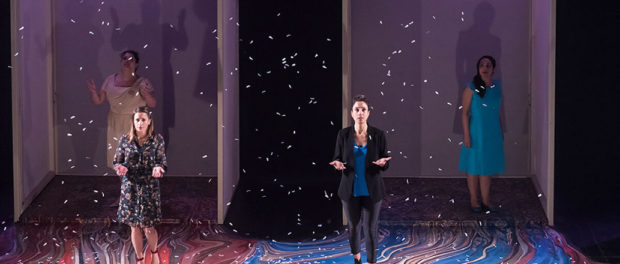The Baklawa Recipe Needs Some Tweaking
 The Baklawa Recipe. Natalie Tannous, Eleanor Noble, Anne-Marie Saheb and Christina Tannous. Photo Antoine Aaito
The Baklawa Recipe. Natalie Tannous, Eleanor Noble, Anne-Marie Saheb and Christina Tannous. Photo Antoine Aaito
The Baklawa Recipe by Pascale Rafie, translated by Melissa Bull, and directed by Emma Tibaldo, is a play which had everything going for it, an immigrant story about two cousins from Lebanon who marry two Lebanese brothers living in Montreal, and their daughters. The possibility for intergenerational conflict (as this story started in the late sixties), is terrific. The event itself, written by a woman, directed by a woman, and acted by four women (Eleanor Noble, Anne-Marie Saheb, Christina Tannous, Natalie Tannous), two of whom are sisters, was so exciting.
What went wrong? The sound design which started with the most irritating phone noises, didn’t enhance anything, and was grating; it interfered with the dialogue, which was accented and needed special attention. The set was beautiful, but the concept didn’t do anything for the four actors; it kept them separated as they gave countless monologues. Have you ever been in the company of immigrant women who never touch, never hug, and never kiss? In what world do these women assimilate enough to come across so cold to each other?

The Baklawa Recipe. Natalie Tannous, Eleanor Noble, Anne-Marie Saheb and Christina Tannous. Photo Antoine Aaito
The story was simple and elegant and needed some tough dramaturgy. The best and most interesting scenes were the ones with actual dialogue. The back and forth of the older generation as they bake, was one of the best moments, although hardest to hear over the noise design. The scene of the daughters breaking out and away from their mothers and the culture they tried to impose, could have been longer and more developed.
Some of the behaviour was obscure and seemed just fortuitous and the final scenes went on and on and did little to tie up a lot of loose ends. Nathalie Tannous was always a delight on stage and one only hopes that she will be given more opportunities to act. Eleanor Noble was very believable as Rita’s daughter and Anne-Marie Saheb had some wonderful moments but wasn’t given the opportunity to really fulfill the promise of the early scenes. Christina Tannous was compelling as the one who cannot fit in. Her singing was lovely, but as there was no translation of the songs, I experienced a kind of “dead” space as it did nothing to further the story
I believe in translation and love the opportunity it provides for revision and re-imagination. This translation needed a new dramaturgy and an innovative design. Instead it was very much caught up in the clichés of immigrant communities, which are complex and can be difficult to tolerate. At what point can women pull out of the traditions of the old ways and re-invent themselves in the new.
A friend of mine once told me the story of a cousin of his who had been educated in New York and got her Ph.D., and returned to Iran to be a fourth wife of a wealthy aristocrat. When I questioned the truth of this tale he told me that she simply wanted to “be cherished”. I was shocked at his response, but I later realized I was looking through the eyes of a woman who had done everything to fit in, including going to theatre school and acquiring a neutral accent.
Many of my dearest friends are children of, or are themselves, immigrants or refugees, and our stories are very compelling just as this one is. Theatre however has its own exigences and this play did not meet the test. It was slow in transitions and had too many monologues as it ran for almost two hours without a break
The Baklawa Recipe is at the Centaur Theatre (453 St François Xavier) until February eighteenth. For information on tickets and showtimes, click HERE.
1 Comment on The Baklawa Recipe Needs Some Tweaking
Comments are closed.






You nailed it Anna. The characters are so cut off from each other and even their own drama that I couldn’t figure out what was happening to Nadia (slowly going mad) until the very end of the play. Then, moments of high drama like Rita’s (long long long what? so long long) death scene verges on farce. The play needed much warmer direction.